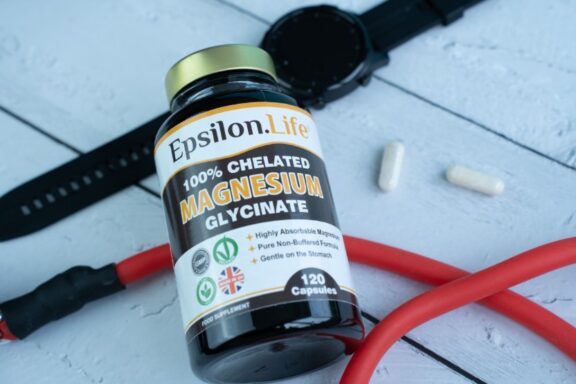You may have heard of N-acetyl cysteine (NAC) before, as it is a popular dietary supplement. But what is NAC, and what are its benefits?
N-acetyl cysteine (NAC) is a cysteine supplement. NAC is available as a dietary supplement in tablet, capsule or powder form. Consuming enough cysteine and NAC is essential for a variety of health reasons, like refilling glutathione, your body’s most potent antioxidant.
NAC also aids in the treatment of chronic respiratory diseases, fertility, and brain health. NAC can also be used to prevent acetaminophen (Tylenol) overdose.
N-acetyl cysteine, or NAC, is a supplement with many uses and a few downsides.
By the end of this article, you will have a better understanding of the benefits of NAC and whether it is right for you. Let’s take a look at them more closely.
The Science Behind NAC
As a supplement, NAC is a powerful antioxidant both in vivo and in vitro. NAC is a forerunner to L-cysteine, which results in glutathione biosynthesis. It directly scavenges free radicals, particularly oxygen radicals.
It is also suggested as a potential treatment option for various disorders caused by the production of free oxygen radicals.
It is a safe and long-lasting mucolytic drug that lowers mucous discharges. It has been used to treat a variety of diseases, either directly or in combination with other medications.
The Role Of NAC in Making Glutathione
NAC, along with two other amino acids, glutamine and glycine, is required for the production of glutathione. One of your body’s most important antioxidants is glutathione which helps neutralise free radicals that harm cells and tissues.
Glutathione serves several functions in the body, including:
- cellular activity regulation
- maintaining a healthy immune system
- free radicals that cause cell and tissue damage are neutralised
- psychiatric disorders
- infertility
As we age, our glutathione levels naturally decline, which is why it’s more important than ever to make sure we’re getting enough NAC.
Please be sure to have a look at this article devoted to glutathione if you’d like to read more about this remarkable antioxidant!
Health Benefits of NAC
When it comes to your health, there are so many potential benefits of taking NAC. Most notably, it can help counteract the effects of oxidative stress and bolster your immune system.
It can also boost mental health by reducing anxiety and depression and improving brain function. NAC also helps protect against liver damage and has anti-ageing properties, making it an ideal supplement for anyone looking to stay healthy and active as they age.
Let’s take a closer look at eight reasons why you should be taking NAC:
Prevention Of Kidney and Liver Damage
NAC aids in detoxification to prevent or reduce kidney and liver damage. It can also help prevent drug and environmental toxicity side effects.
Doctors routinely administer NAC to people who have overdosed on acetaminophen (the active ingredient in Tylenol) to prevent or reduce kidney and liver damage.
May Improve Psychiatric Disorders and Addictive Behavior
NAC aids in regulating glutamate levels, the most crucial neurotransmitter in your brain. Normal brain activity needs glutamate, but an excess of glutamate combined with glutathione deficiency can damage the brain.
This may contribute to mental illnesses such as bipolar disorder, schizophrenia, obsessive-compulsive disorder (OCD), and drug abuse disorder.
NAC supplements can also help people with cocaine addiction reduce withdrawal symptoms and prevent relapse.
May Help Relieve Symptoms of Respiratory Conditions
NAC may help relieve respiratory symptoms by acting as an antioxidant and expectorant, loosening mucus in your airways.
Oxidative damage and inflammation of lung tissue cause airways to constrict, resulting in shortness of breath and coughing in people with chronic obstructive pulmonary disease (COPD).
NAC may also help people with chronic bronchitis. Bronchitis occurs when the mucous membranes in the bronchial passageways of your lungs become inflamed, swell, and close off airways to your lungs.
NAC May Help Improve Brain Health
NAC has the potential to treat conditions such as Alzheimer’s and Parkinson’s disease by aiding in the replenishment of the antioxidant glutathione and the regulation of glutamate.
Glutamate, a neurotransmitter, is involved in various behaviour, learning, and memory functions. While glutathione, an antioxidant, helps reduce brain cell oxidative damage associated with ageing.
NAC supplements appear to improve dopamine function and disease symptoms like tremors. But more research is needed.
Stabilizing Blood Sugar Levels
Obesity and high blood sugar levels both contribute to fat tissue inflammation. This can cause insulin receptor damage, increasing the risk of type 2 diabetes.
According to animal studies, NAC may help stabilize blood sugar by reducing inflammation in fat cells and thus improving insulin resistance.
Reduces Heart Disease
Heart disease is frequently caused by oxidative damage to heart tissue, which results in strokes, heart attacks, and other severe conditions. N-acetyl cysteine can reduce oxidative damage to your heart, lowering your risk of heart disease.
NAC has also been shown to boost nitric oxide production, which aids in vein dilation and blood flow. This speeds up blood flow back to your heart, potentially lowering your risk of a heart attack.
It Has The Potential to Increase Fertility in Both Men and Women
Infertility affects approximately 15% of all couples attempting to conceive. Male infertility is the primary contributing factor in nearly half of these cases.
NAC has been shown to improve male fertility in some cases and may improve fertility in women who suffer from polycystic ovary syndrome (PCOS) by inducing or enhancing the ovulation cycle, though more research is needed to confirm these effects.
Are you looking for ways to improve your male fertility? Discover our 9 tips on diet, supplements and lifestyle changes that can boost men’s fertility naturally.
Support Immune Function
NAC has been used in clinical practice for people hospitalised with COVID-19 because of its antioxidant and anti-inflammatory properties.
A 2021 study found that taking 600 mg NAC orally twice daily for 14 days resulted in slower disease progression, less need for intubation, and lower mortality.
To sum up, in addition to its many positive impacts on physical and mental health, NAC can also be beneficial in supporting the body’s detoxification processes – a key factor in reducing inflammation and promoting overall wellness.
N-Acetyl cysteine has been used to treat various respiratory disorders like asthma, bronchitis, COPD (chronic obstructive pulmonary disease), sinus infections and even cystic fibrosis.
Risks, Side Effects and Interactions
For the most part, NAC is considered safe NAC for most adults, and there have been no significant adverse effects reported. However, it can interact with certain medications and supplements—so it’s important to always check with your healthcare provider before starting a new supplement regimen.
It’s also important to note that NAC can interact with anticoagulants (blood thinners), so you should definitely not take the supplement if you already take this medication and be extra cautious if you’re considering taking both at the same time.
NAC allergies are uncommon, but they do exist. The danger is most significant during NAC infusions. An infusion may cause anaphylaxis 12, a potentially fatal allergic reaction. In the event of anaphylaxis, intravenous NAC should be administered under medical supervision.
The most common side effects of taking NAC orally are nausea, vomiting, and diarrhoea.
Please note that you should not use food supplements in place of a well-balanced diet and a healthy lifestyle. Consult your healthcare provider if you believe you are experiencing a side effect from NAC supplementation.
Interactions
There aren’t many known drug interactions with NAC. It may, however, intensify or interfere with the action of certain medications, including:
- Angina medications
- Blood thinners
- Diabetes treatment
- Antihypertensive medication
- Activated charcoal
- Chloroquine
FAQ: NAC Supplements
Who Should Take NAC?
If your body is deficient in amino acids, cysteine supplementation may be necessary. Or if you suffer from:
- Kidney and liver damage
- Mental health issues
- Addiction
- Diabetes
- Heart disease
- Infertility
When to take NAC — morning or night?
As with any supplement, timing can be crucial. While it’s generally safe to take at any time of the day, some people find that taking NAC in the morning works best. We agree with that notion. Oral NAC supplements will be absorbed best if taken on an empty stomach at least an hour before eating. We suggest taking it with a large glass of water to avoid discomfort.
NAC may affect sleep patterns, which is another reason why we suggest taking it on an empty stomach in the morning.
However, it’s always best to consult with your GP for personalised advice.
What is the supplement NAC used for?
N-Acetyl Cysteine (NAC) is a naturally occurring amino acid that has been shown to have several benefits for the body. These benefits include supporting immune function, promoting liver and kidney health, and improving cognitive function. NAC may also be beneficial for preventing conditions like heart disease and dementia.
However, like any supplement, there are also side effects associated with taking NAC. These side effects can vary depending on the person but may include headache, dizziness, and nausea.
What is The Recommended NAC Dosage?
Because your body can produce small amounts of cysteine, there is no specific dietary recommendation.
The accepted daily supplement recommendation for NAC is 600–1,800 mg.
If you are recuperating from a medical condition or illness, your doctor may recommend a higher intake for a limited time, depending on your age, sex, and health condition.
Please make sure to speak with your healthcare professional about the recommended intake for you and any potential risks or drug interactions.
Final Thoughts on NAC Benefits
NAC has a vital role in human health. It is well known for its ability to replenish glutathione levels, and it controls the essential neurotransmitter glutamate. NAC also aids your body’s detoxification system.
So there you have it, an overview of what NAC is, its role as a food supplement and its impressive benefits. Remember, as with any supplement, it’s always best to consult with a healthcare practitioner before starting a new regimen.
Discover our powerful N-Acetyl-Cysteine (NAC) supplement – vegan capsules with no artificial filler, 600mg of NAC each, made right here in the UK.



